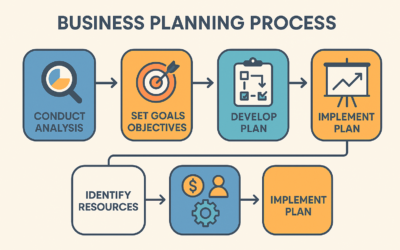It’s the 2020’s and small business owners who have been avoiding social media and are now nervously asking themselves if having a presence on social media is worth it. If they should have a presence, how do they manage it and which social media platforms should they be on?
After all, most small businesses don’t have a marketing team or even a marketing specialist.
Small businesses can benefit from a presence on social media.
Research has found that a social media presence can increase awareness and inquiries, enhance relationships with customers, and increase the number of new customers. You can even easily begin reaching customers almost anywhere in the world.
Here are 8 tips to get you started.
1. Set SMART Goals
Start by deciding what you want from social media. Set yourself SMART goals which are specific, measurable, achievable, relevant, and time-bound.
An example of a great SMART goal for your social media might be to increase your email signups by 10% in the next six months.
You can easily measure this after six months by counting how many new subscribers you have achieved.
Social media is great for growing brand awareness, trust, and familiarity with your services and your brand.
2. Do Just a Few Things, But Do Them Well
Don’t take on too much, you don’t need to turn into a media company producing videos, blogs, and podcasts. Start with just a few social media platforms so that you don’t create too much work for yourself and can fully focus on each one.
Think in terms of quality first, then quantity. Active accounts achieve higher engagement, but the content must appeal to your ideal customers
If you reach interested customers, turn them into fans of your brand, and get them involved in what you do, that’s an effective social media strategy.
3. Understand Your Audience
Using social media is all about knowing your clients and posting about what matters to them.
Post valuable content that somehow helps your customers. Use the social media platforms your customers use. Do a little research and see which accounts they follow, what posts they like, and share. This will give you more idea about what matters to them.
Don’t just write about your business. Think about why you follow certain brands. There’s a reason beyond their product, right? Apply that same thinking to your business and figure out exactly what your ideal client wants to see from you.
4. Start Conversations
Make your posts informative, inspirational, and promotional, but in every post, try to include a call to action. Train your followers to interact with your brand.
Ask them questions, get their opinion, and talk about things that stir up emotion. No matter which industry you’re in, there’s an aspect of your product or service that’s tied to a feeling or experience your ideal client wants to have.
Only 10% of messages and comments left on business social media accounts are answered. Make sure you set time aside to respond to your customer comments.
5. Schedule Your Posts
You’re running a business, so every minute counts! Posting consistently shows your potential clients you take your business seriously, and they should, too.
Make technology your best friend by scheduling posts in advance. This keeps you consistent, plus it saves time. If everything is scheduled, you’re not getting distracted scrolling through your feed instead of posting and getting back to work.
6. How Often Should You Post?
That depends on your availability, but as a guideline, daily stories and posts for Instagram: once a day for Facebook. Twice a day on Twitter at times your customers are online, and several times a week on LinkedIn, focusing on video content.
7. Social Media for Small Business: Paid Posts
Facebook advertising is particularly effective at reaching a specific demographic. Set yourself a budget, you could start with $20/advertisement, but make the offer attractive.
8. Experiment and Pivot
Don’t expect great results immediately. Take your time to figure out what suits your clients and be prepared to try different things like showing two different ads to the same audience. Then check out which one performed best.
Make use of the free analytics tools available on social media platforms. This is an easy way to see your engagement and conversion rates.
Social Media Strategies for Small Business
The core of effective social media marketing for small businesses revolves around consistently providing high-quality content. Consistent doesn’t necessarily mean “a lot”. You must find a rhythm that works both for your audience and for you to keep providing value in an interesting, entertaining way. Engage in conversation with them. Use trial and error; it’s ok to make mistakes!
For Global Resources solutions, check out http://www.gr-us.com/.

0 Comments